Just like an iPhone or a sonic screwdriver, a WordPress site is made up of many parts that have to play nice together. Playing nice doesn’t happen by accident. It takes planning.
It takes time, money, talent, resources, and materials. And then even more planning. Planning is even more important when starting your WordPress site. To do this right, you need a development schedule.
What a Development Schedule Can Do For You
Planning a project is as crucial as developing the project. It helps you define milestones, keep on track, and stay within budget. A project schedule can help keep you from making expensive mistakes. It improves communication within the project team and helps ensure everyone is on the same page. It identifies who is responsible for what (something that is vitally important for larger teams).
Creating the Development Schedule
A good development schedule will show what your project should consist of and who should be in charge. To create the development schedule you will need to answer some questions:
- Do you need a domain name? If so, how much will it cost?
- Who will host your site? How much will it cost? Will you pay monthly, yearly, or multi-yearly?
- Who will install WordPress on your domain?
- Which WordPress theme will you use? Will it be free, premium, or custom built? Will it need custom design? Who will design it?
- How many pages will your site have?
- What are the categories your site will have?
- What content will you have? Who will create it? Will it be a multi-author site? What is your posting schedule? Will you use photos and graphics? Where will they come from?
- What plugins will you use for SEO, security, anti-virus, and statistics?
- Will it have e-commerce? Will you use e-commerce plugins? What are they and how much will they cost?
- Will you need custom graphics for your logo or other designs?
- What keywords will your site use?
- What links will your site need?
- How will you use social media with your site and who will handle it?
- How will you get traffic to your site?
- How will customers/clients/readers communicate with you? Will you have domain-level e-mail? Will your site include comments? Who will communicate with your customers/clients/readers?
- Who will maintain the site? Who will update your theme and plugins? Who will fix it if it gets hacked or hit by malware?
Wow, that’s a lot of questions! As you can imagine, the answer to each of these questions is vital to your site’s performance and implementing these elements will take some planning.
Who’s Running the Show?
If you have the technical know-how, and the time, you might be able to do all of these tasks yourself. If not, you will need a team. Depending on the needs of your site, your team could consist of a team leader, programmers, designers, and a database administrator.
Your team will need a team-leader: a project manager that keeps an eye on the schedule and helps keep everybody on track. If this is a one-man or one-woman show then you have to decide on what you’re capable of accomplishing yourself. If you have a small budget, maybe you will start with free themes and plugins and upgrade later. Maybe you will create your own logo for now and hire a designer later. A WordPress site is something that can grow and expand over time. It doesn’t have to be perfect and complete from day one. However, it does have to work and meet the minimum expectations of your customers/clients/readers. It can start as a minimal viable product, but it still has to give them a good experience.
What a Development Schedule Will Look Like
The schedule will include the tasks to be completed, the time-frame, budget, and resources for each task. Your schedule should include:
- Determine the goals of your site
- Preliminary design
- Develop the backend, including the database, server, and URL
- Conduct testing
- Develop the frontend, including theme installation (logo, widgets, categories, pages, and posts) and plugin installation (security, antivirus, SEO, and maintenance)
- Conduct testing
- Develop content
- Conduct testing
- Promote your site through marketing, social media, and SEO
- Launch
- Perform routine site maintenance
In order to keep the project on track these tasks should go in a Project Planner. This can be a stand-alone program, a template in Office or a similar program, or you can even use a notebook. A good planner would be updatable and sharable with the project team.
Project Planners
The most efficient way to keep a project on track is to use a project planner. There are many project planners and templates available. Some are free. Some are not so free. Many use Gantt charts, which lends itself well to a project schedule. Here is a look at a few planners and templates designed to keep your website development on schedule.
Tom’s Planner
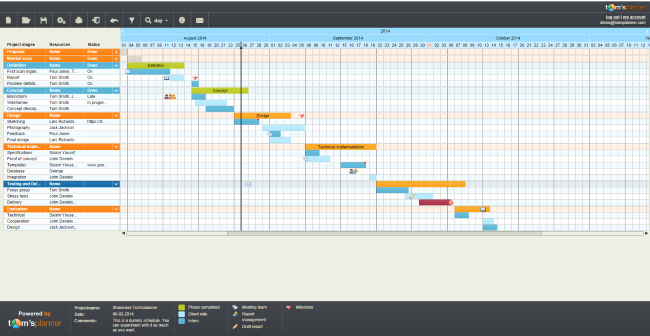
Tom’s Planner creates Gantt charts for the purpose of website development. It’s intuitive and easy to use. It comes with a project plan that can be edited to your needs. It comes with preset stages and sub-stages that can be easily edited. You can see details, like hours per row, to know if your project is staying on schedule. The schedule can be shared with the team either online or offline. It plays well with other apps too, as files can be imported from Project, Excel, CSV, tables in Word and websites like Basecamp, Google calendar, Trello, and JSON. Files can be exported as images, PDFs, or in Project, Excel, CSV, or JSON.
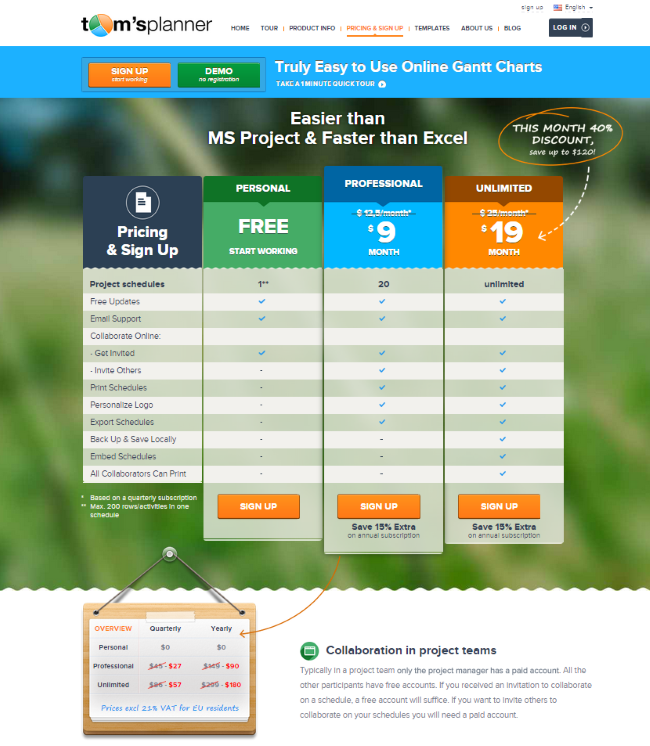
The price isn’t too terrible either with prices ranging from $0 to around $20 a month. This is money well-spent to keep a WordPress site project on schedule.
Vertex42 Gantt Chart Template Pro for Excel
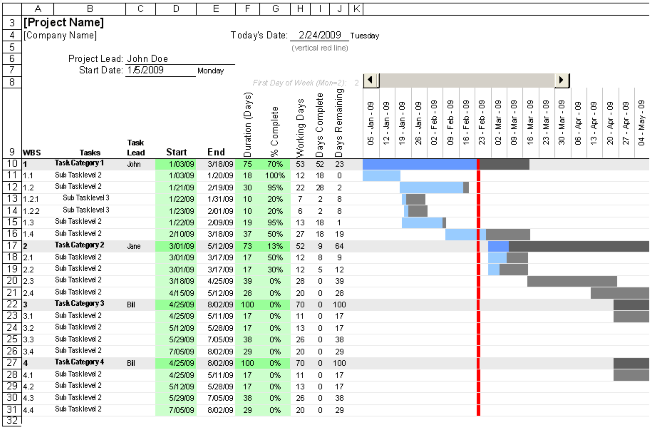
You can create your own project schedule in a Gantt chart for Excel but this one from Vertex42 is already created for you at a reasonable price and has almost no learning curve. It includes 9 bonus templates and training videos on setting up your Gantt charts.
Another option is to create your own schedule. This tutorial from Microsoft teaches how to create a project schedule in Microsoft Project.
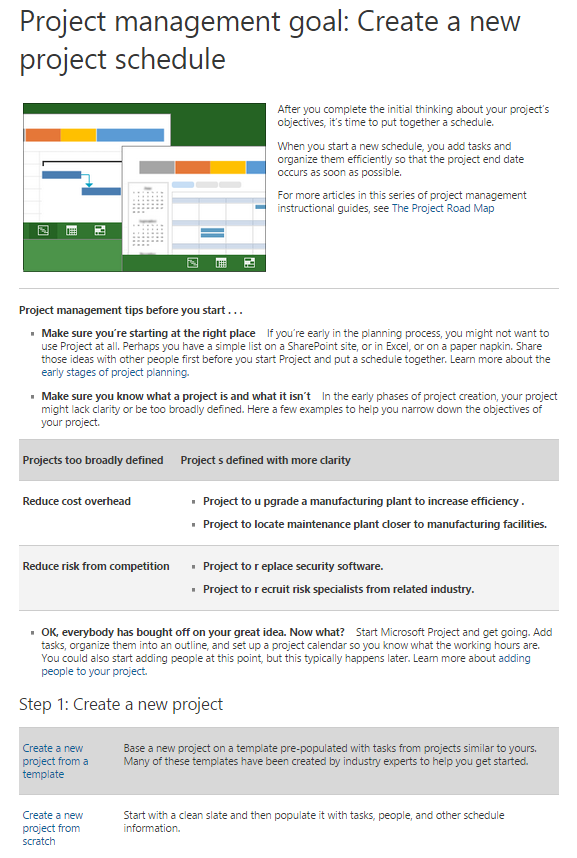
You’ll learn how to create the project, add and organize tasks, set up calendars, and publish the schedule. If you’re already a Microsoft Project user this is a great way to develop your own custom schedule.
Once your WordPress site is up and running, it will require continuous improvements and maintenance. Now’s a good time to use a WordPress plugin to manage the schedule directly from WordPress itself, allowing you to manage both your content and your project from the same application.
WP Project Manager
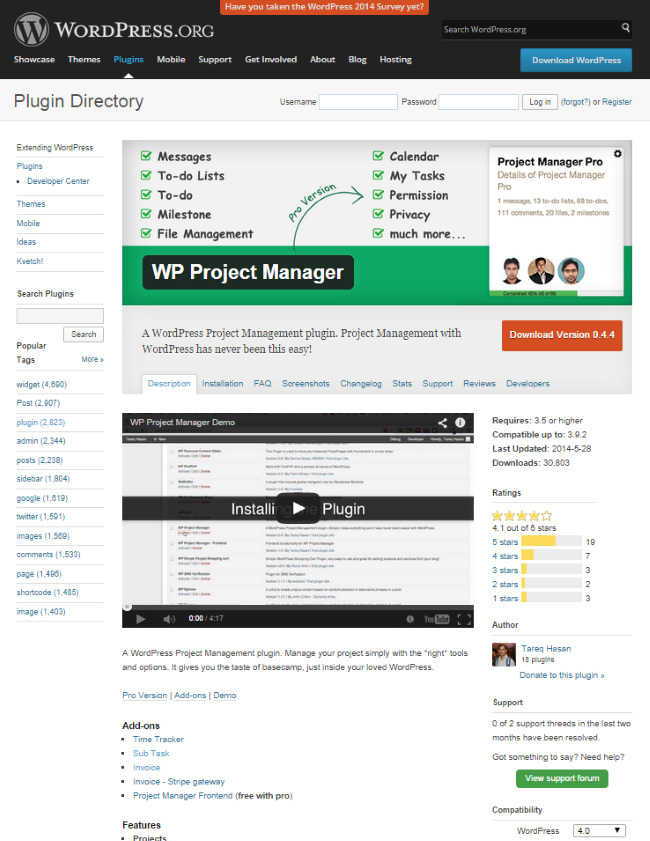
This plugin is available as a free edition or a premium edition if you want more features. The free version allows you to easily set up a project that includes messages, to-do lists, milestones, and file management. You can send project information to the team through customizable email, too.
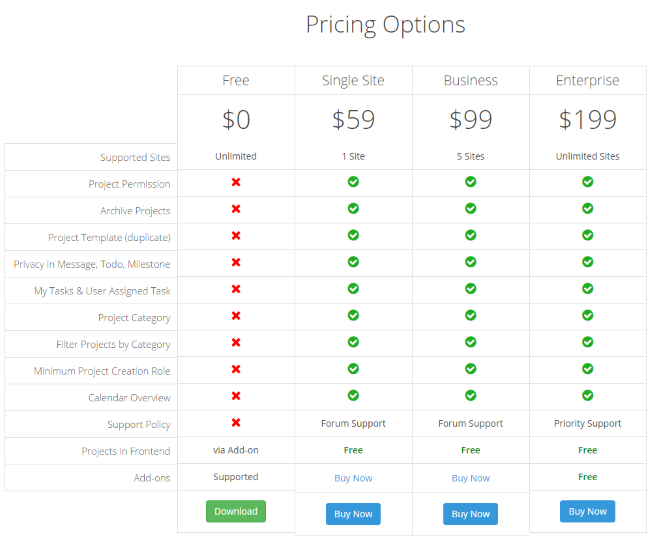
The premium edition starts at $59 and includes a user front end, calendar, my tasks, user permissions, privacy, archived projects, categories, and other features that simplifies project management.
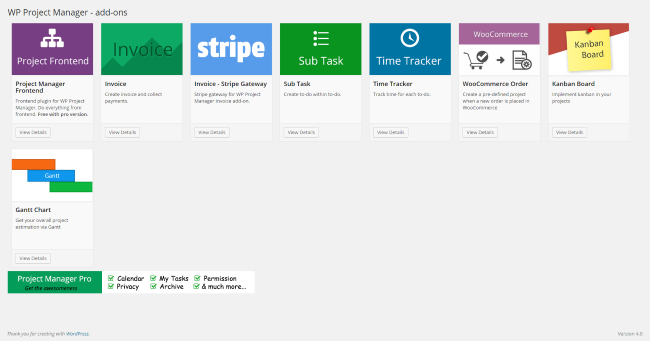
The Pro edition is expandable through reasonably priced add-ons that add full-featured business functions to WordPress.
Final Thoughts on Creating a Development Schedule for Your WordPress Site
Creating a development schedule is crucial in starting up your WordPress site. It helps keep your project on schedule and on budget, and keeps away those pesky surprises that can set you back or even derail the whole thing. There are many options for creating the schedule itself including pre-made programs, templates, and plugins. Whichever you choose, starting your WordPress site off on the right foot is the first step to a successful site.
Do you use any of the solutions detailed here to manage a development schedule? Find another tool more appealing? Please share it in the comments below!









Leave a Reply